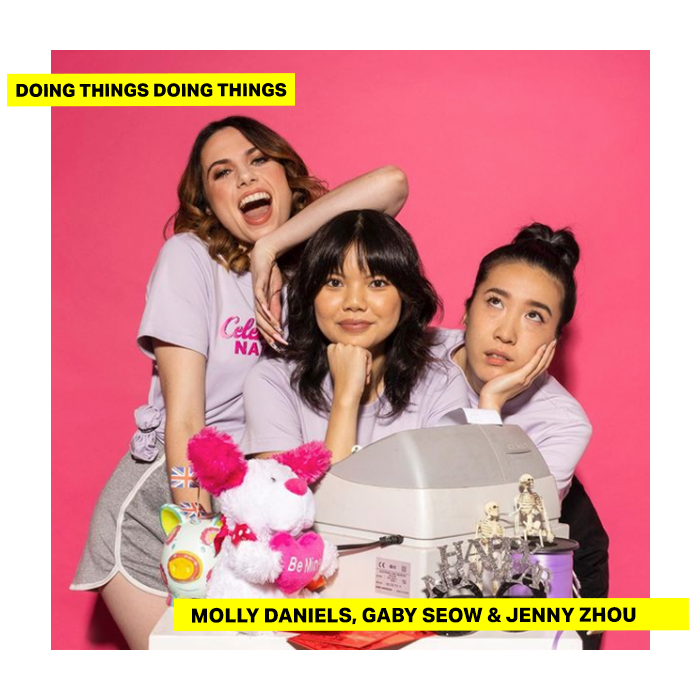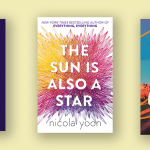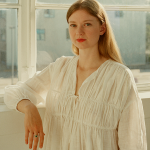Need a laugh? Something “dumb and fun” to bring a little joy to your day? We’ve found just the thing: Celebration Nation, a comedy web series created, written by and starring Australian actresses Jenny Zhou, Gaby Seow and Molly Daniels. Set in a suburban party store, Celebration Nation is an outlandish love letter to working a shitty retail job and wild ride that is customer service – an experience that most young people can relate to, for better or for worse!
Thanks to the 2020 Skip Ahead grant from Screen Australia and YouTube, Jenny, Gaby and Molly were able to fully invest in this creative project – a comedy story that not only centres sexually and ethnically diverse women on-screen, but shakes up the traditionally male-dominated world of television production with an inclusive and diverse crew behind-the-scenes. The production never had more than three cis-gendered, straight white men on set, an achievement in its own right.
We spoke to Jenny, Gaby and Molly about making their dream show, hiring for diversity, and why everyone thinks young people only watch trash TV.

How did the concept for Celebration Nation come about?
Gaby: This all started in lockdown for us. We met in LA doing pilot season in 2020, and we all had to come home because of coronavirus. We were so uncertain if there was going to be work for us in the coming year, we were like “What can we do to support ourselves as actors?” Jenny had a YouTube channel, and we were lucky to find the Skip Ahead initiative that we could apply to.
We brainstormed and thought, what do we know best? What do people in our age group know best? What are the memes we see on the Internet about? We narrowed it down to a retail-based comedy because everyone has at least done a one-week trial shift or something in retail.
Molly: I was actually in a two-week quarantine at my parents house which is around the corner from a party shop. The three of us were trying to think of something that looked fun and would allow us to write stories that weren’t just about the people working in retail, but about the situations. So we thought, if it’s a holiday store every episode could be a different holiday. You can see what kind of things happen on each day – for Valentine’s Day, someone has a crush on a customer, for New Year’s Eve you’re trying to leave early for a party. That was the ammunition to write these robust episodes.
What was the process of applying for the Skip Ahead grant? How much of the series did you have fleshed out for the application?
Jenny: It was chunky! We worked on the pitch for almost three months. We had two to three Zoom calls every week where we would come up with plotlines, characters. Basically every episode outline changed a lot later on but we did initially have to flesh out a lot more than I thought we would. And we also tried to make it as fun as possible, whether it was using Canva to make the application cute or having fun brainstorming sessions with cocktails – we tried to make it a nice lockdown activity to be creative as well.
Which episode was the most fun to create?
Molly: We came up with the Queen’s Birthday episode like, immediately, and that storyline never changed. I think because it’s so silly! We thought, “What’s the dumbest holiday to do? What if on the Queen’s Birthday the store was overrun with British people that love Lizzie and are obsessed with her?” Even when other people said it was kind of weird, or we should cut two episodes we were like “Not that one!”
Apart from being wildly funny and a creative outlet for you all, what did you want Celebration Nation to achieve as a project?
Jenny: There is a really big gap in stories for that 18 to 35 age range. You’ve got high school dramas, like Riverdale, or you’ve got older stories like Offspring or Packed to the Rafters. And everyone says that young people watch such trashy reality TV, but it’s because there’s not a lot of scripted content going around for that age bracket.
This is why we’re always on TikTok until 3am laughing in the dark, because there is nothing else for us to watch! So that was a very important part of it, to make that age bracket feel seen.
Gaby: We watch shows, like Broad City for example, where women slightly older are playing themselves in their 20s. They’ve stepped into the 20-something role. But now we’re too old to play high school kids, but too young to play women in their 20s – it’s an awkward spot we’re in. So we made Celebration Nation to bring in elements of what we loved, what we found funny, and to play our actual age range.
Molly: Once we built this retail world and we’d come up with the premise, our biggest agenda was writing ourselves really great parts that we don’t get to play. Gaby is the militant, obsessive character, Jenny’s a hysterical manager, I’m totally ditzy – we’ve never really played parts like that, because we never get auditions for those parts.If you are in the privileged position of getting to write your own work, do whatever you want! Go nuts!
You made a very important commitment to diversity with Celebration Nation. How did you ensure you had diversity throughout the cast and crew?
Molly: As with a lot of problems like this in the world, it’s often just a matter of the same people getting the same jobs over and over again. I started acting pretty young and I literally thought sets were just full of middle aged white men, because that’s what it was. And that builds into this system. So our thought process was, when you’re in the industry, when you’re in this position, how do you pay it forward? Hire fresh faces. And when you hire fresh faces, they are from all sorts of backgrounds.
Jenny: We turned to Facebook, Flickr, all those groups, and we cast the net really wide through word of mouth, through previous productions we worked on. We just wanted it to be as diverse as possible. And I think it really paid off because the crew was so amazing. It wasn’t a high stress set – they made it as such, like a fun, calm experience. I think it’s because we made such an effort to make sure that it was as diverse as possible, and people were as represented and comfortable as possible that made the team so cosy.
Gaby: We got a lot of applicants of all ages and experiences. And we really just thought, why shouldn’t we give opportunities to people who are just starting out? Who have only one credit on their resume? It was so important to us to help newcomers into the industry, and most of the people who didn’t have as much experience are people from diverse backgrounds, just because of how the industry has worked for so many years.
The entertainment and arts sector has been devastated by the pandemic. Do you guys have any thoughts about what needs to happen to get the sector thriving in Australia?
Gaby: Going forward you can only hope that people in the theatre and stage productions get looked after just as well as the film and TV. Because we can go ahead with COVID safety precautions, but it’s so difficult with an audience in a small theatre space. We can only hope that decision makers are working to adapt and be quicker to resolve these issues.
Jenny: Even as audience members I think a lot of us forget the importance of entertainment and art, especially during a pandemic. Because what are we doing at home? Watching, reading, listening. It was very disheartening when the government announced they were putting $2 million back into the arts industry to hear people say, “Why do these performers need money? Can’t they just get another job?” It’s like, we have another job and we’re still trying to do this job! I think we always forget the importance of [art] and how much joy it does bring us. And in times like this, joy is very fleeting and sought after. So I do think as the audience we need to treasure the arts a little more.
What advice would you give to young people who are wanting to get into the entertainment industry – whether that be acting, writing, producing, filming?
Molly: Especially as an actor, you get rejected. You hear way more ‘no’ than you do ‘yes’. But we’re so lucky now because you can make stuff whenever. You have YouTube, you have a camera on your phone, you have TikTok… you can make something for $0 and put it online and get it done. So if you want to do something, go out and do it. Don’t wait for anyone else to say yes – like, get the ‘nos’ but don’t wait for someone to say yes. You can’t reject yourself.
If you have ideas they’re probably worth sharing. You know, the retail thing – that’s been done on TV and films before, like, we knew we weren’t breaking any new ground. But our vision for it was something different, for all the reasons we’ve talked about. So if you think you have an interesting thing to say, your voice is something that we all want to hear.
Jenny: Having your own community of support as well is very important. Especially in the entertainment industry, having people who work in a similar field is good because you can share jobs and might not be suitable for you, but it’s better for them, and they’ll do the same for you. And having a good old rant every now and then is very nice!
What do you hope is next for you all? What do you hope Celebration Nation leads to?
Molly: I have wanted the same thing forever: I just love comedy TV. And honestly Celebration Nation is a huge deal, because I have always wanted to make comedies that centre women. So I’d love to do a half hour sitcom thing. Just something really fun and dumb, where I get to make stuff and with my friends would be the dream. Really, I’ve gotten that already! But that’s my dream, to keep making cool stuff with cool ladies.
Gaby: I didn’t think we were gonna get this funding! It was just an idea. I still remember the day we got that call, I’ve never had that feeling before. I’ve never created anything before. And normally when you get a “no” it’s from, like, a 55-year-old male casting director. And he’s like, “She just has the wrong nose.” But now someone liked us for our idea, which is so thrilling and exciting. So I want to pursue this more. Change comes from behind the scenes – as much as I love being an actor, I know that change can really happen back in the writers room where we can write these normal, everyday roles for people of colour as well.
Jenny: Yeah, and I hope that we have more confidence and believe in ourselves a bit more as well. This is very new to us. And it was a very big shock that someone actually listened to us, and they were actually interested in our stories. So I hope that in five years time we don’t have to explain ourselves as much. We’re more sure of who we are, and that the industry is also more open to listening as well. For me I think self-confidence is a very, very big thing and once you achieve it you’ve unlocked so much potential.
You can stream every episode of Celebration Nation on YouTube.





